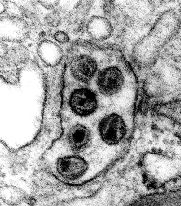Human immunodeficiency virus (HIV) mainly infects and destroys CD4 cells, an important component of the human immune system. The rate of this cell destruction, which ultimately leads to the development of the acquired immunodeficiency syndrome (AIDS), can vary greatly between patients. It has been suspected for some time that genetic factors contribute to the rate of progression to AIDS. A research team from the Genome Analysis Group at the Leibniz Institute for Age Research – Fritz Lipmann Institute (FLI) in Jena, Germany, together with colleagues from the Department of Infection Models of the German Primate Research Centre (DPZ), Göttingen, the Institute for Medical Informatics and Statistics of the Christian-Albrechts-University, Kiel, and the Cologne Centre for Genomics of the University of Cologne, has now discovered such a genetic factor.
In their study, the researchers made use of a particular animal model of AIDS, rhesus monkeys (Macaca mulatta), that benefits greatly from its close evolutionary relationship to humans. According to the research team’s working hypothesis, genetic factors that influence the course of virus infection in rhesus monkeys should play a similar role for HIV infection in humans. “Therefore, people at the DPZ in Göttingen have collected and comprehensively characterized specimens from rhesus monkeys with virus-induced immunodeficiency over a period of 15 years“, explains immunogeneticist Dr. Ulrike Sauermann. “With these unique specimens, we were able to screen the genome of rhesus monkeys for variations associated with the rate of disease progression in that species“, says Professor Peter Nürnberg, human geneticist at the University of Cologne. Two relevant genomic regions were discovered. One of them was located on rhesus chromosome 4 and encodes genes of the immune response that are well known to be activated following viral infections in both rhesus monkeys and humans.
The discovery of a region on the rhesus X chromosome, however, was a real surprise. “In almost 30 years of intensive HIV and AIDS research, no evidence has been found so far for a contribution of the sex chromosomes to disease progression”, commented genome expert Dr. Matthias Platzer, head of the Jena laboratory. It had been known for some time, however, that surprisingly smaller numbers of viruses and higher numbers of CD4 immune cells can be found in the blood of some HIV-infected women, compared to infected men.
In order to confirm the rhesus findings in humans, the team analysed the analogous region of the X chromosome in HIV-infected patients. “With the target set by the animal model, we were able to discover a genetic variant that is associated with a reduced rate of CD4 cell loss in some female AIDS patients“, underlines Professor Michael Krawczak, population geneticist from the University of Kiel. A second surprising, yet inexplicable result was that men do not seem to benefit from the sequence variant of interest. “In essence, we have shown for the first time that a single nucleotide polymorphism (SNP) on the X chromosome is associated with a delayed progression of HIV infection in females”, says molecular geneticist Dr. Roman Siddiqui from the FLI, who currently pursues follow-up research projects at the DPZ.
The disease-associated SNP lies between two genes in a region that has remained almost unchanged during the evolution of humans, chimpanzees, rhesus monkeys and mice. Future investigation of the little-known function of these genes will help researchers to assess whether and how the genes may impact the rate of immune cell loss after HIV infection and the consequent progression to AIDS. Remarkably, the beneficial SNP variant is more frequent in Asian than in African and European populations. While only 20% of HIV-infected women of European decent analysed so far carried the advantageous SNP variant, it is expected to occur in the majority of Asian women. The identification of the disease relevance of this variant is likely to open new paths for research on sex-specific aspects of HIV infection and AIDS treatment.
The study was supported by the German Federal Ministry of Education and Research through the National Genome Research Network.
Publication
Siddiqui RA, Sauermann U, Altmüller J, Fritzer E, Nothnagel M, Dalibor N, Fellay J, Kaup FJ, Stahl-Hennig C, Nürnberg P, Krawczak M, Platzer M. X chromosomal variation is associated with slow progression to AIDS in HIV-1-infected women. Am J Hum Genet. 2009, 85(2), 228-39. doi: 10.1016/j.ajhg.2009.07.013.









